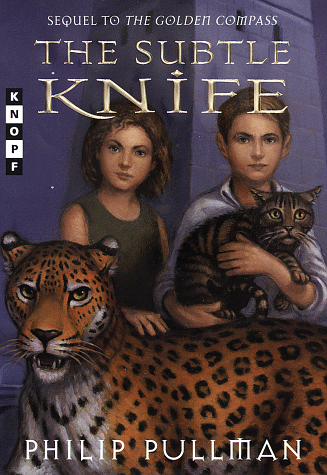One of my first ever blog posts was when I reviewed Philip Pullman's The Golden Compass. Why it's taken me almost two years to get to and read through the sequel, The Subtle Knife, is anyone's guess.
The first book took place in a world where everyone has a daemon, or spiritual animal, alongside them. Witches, shamans, and other strange cultures stand alongside an all-powerful church that worships "The Authority." There are always little names and places that hint at it being very similar to our world, but it feels like a fantastical parallel that Pullman has used in place of Earth.
That all goes out the window when we meet Will, who lives in the real world. Somehow, though, he manages to find a gap in reality that takes him to other worlds, and these "windows" are the focus of this book. Like Lyra, Will has an internal struggle to deal with while he learns the art of using a powerful tool. The call of childhood comforts constantly pulls at his need to fight, to win, to kill in order to survive.
I said in the first book's review that you can kind of ignore the religious undertones in it. That, too, has completely changed. The flight of the Angels and the impending war to destroy The Authority are pulling that into light, and I can expect to see this issue take over completely in The Amber Spyglass.
There are other things that have changed, which I don't like so much. Lyra seems really dumbed down here. While she and Will fight a bit early on, after a while she decides she's just going to do what he says. Where's the strong-willed, clever girl with the savage mind I grew to love in the first book? Other characters acknowledge the change, but only in passing.
Because of this closeness that gets established between the main characters, Pullman likes to jump between them freely, revealing the thoughts of both in the same breath. While this could have to do with Lyra's apparent powers of perception, it's still kind of an unfocused view. I felt a little detached at times, and the narrative, filled with vague thoughts, sometimes bored me even though I was rabidly eager to find out what happened next in this amazing plot.
Still, the things I'm unhappy about are certainly not enough to make me drop a story as daring as this one. One thing that still hasn't changed: Philip Pullman is not afraid to take risks, and that is where his work shines.

No comments:
Post a Comment